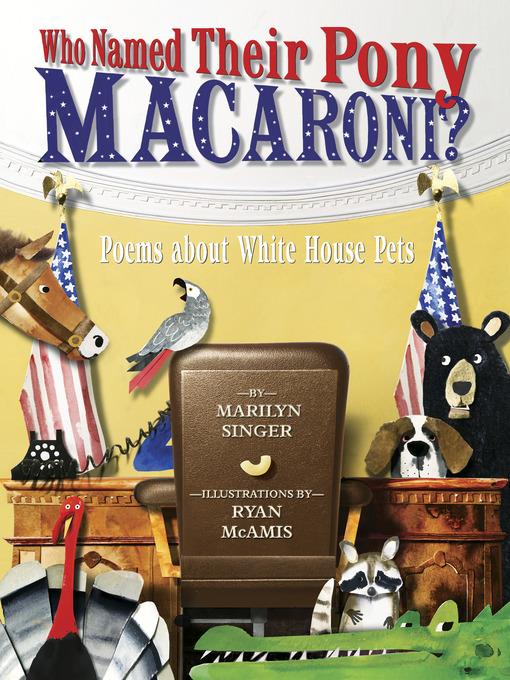
Who Named Their Pony Macaroni?
Poems About White House Pets
کتاب های مرتبط
- اطلاعات
- نقد و بررسی
- دیدگاه کاربران
نقد و بررسی

July 15, 2019
"Along with children, First Ladies, and presidents, / the executive mansion had notable residents." The veteran versifier offers new stanzas on select animals who occupied the White House (often only briefly) or were at least associated with the chief executives. Readers are likely to be impressed by the sheer variety--not just horses, cats, and dogs in abundance, but a mockingbird that Thomas Jefferson "bought from a slave for five shillings," John Quincy Adams' alligator and his wife's silkworms, Benjamin Harrison's possums, Teddy Roosevelt's wild menagerie, and more. Singer writes in casual but controlled metrics that lend each poem a fresh, individual character. She also broadens her general theme both by frequently commenting on the experiences or characters of the animals' presidential owners ("In the White House, / a mouse is not a welcome resident. / Occasionally, neither / is the sitting president") and adding observations at the end that will resonate with pet owners far from the nation's capital and several years away from voting age. In lengthy endnotes she adds still more. McAmis uses clipped bits of paper and found materials to create low-relief collages for each poem. Though he depicts Calvin Coolidge's pair of lion cubs as tigers, the animals and human figures throughout (the latter all white) have homey, domesticated looks. A popular topic explored with humor and respect for its furred, feathered, and four- (more or less) legged cast. (bibliography) (Picture book/poetry. 6-9)
COPYRIGHT(2019) Kirkus Reviews, ALL RIGHTS RESERVED.

October 18, 2019
Gr 1-3-Singer's entertaining, educational poems revolve around presidents and their pets, from Calvin Coolidge's lion cubs Budget Bureau and Tax Reduction to Alice Roosevelt's garter snake Emily Spinach. Singer uses each president's relationship to his animal companion as a reflection of his time in the White House and his administration. Each entry is accompanied by McAmis's whimsical, cheerful collages of animals and presidents. The poems' sing-song manner and upbeat tone echoes the rhythmic structure of nursery rhymes. In the poem "Andrew Johnson's Mice" Singer writes, "Such was Andrew Johnson, who overreached, / got impeached. / Lonely, they say, and loudly decried, / perhaps that's why he identified / with those unloved mice." Singer avoids dissecting the darker parts of American history and provides vague references that may invite further inquiry. For example, in the opening poem about George Washington's dogs, Singer mentions his "plantation." In the poem about Thomas Jefferson's mockingbirds, readers learn that he bought his pets "from a slave for five shillings." The book concludes with a list of every president and his pets (or lack thereof) and a selected bibliography. VERDICT Recommended for poetry collections and history classrooms. These quirky poems are meant to be shared.-Lia Carruthers, Gill St. Bernard's School, Gladstone, NJ
Copyright 2019 School Library Journal, LLC Used with permission.

November 25, 2019
Singer commemorates a menagerie that’s furry, feathered, and even scaly, all of them “witnesses to history” who kept company with, and occasionally provided consternation for, U.S. presidents and their families. Beginning with George Washington’s hounds, a new breed that he created, and moving forward through time, Singer employs an impressive variety of rhyming schemes in service of the parade of animal names: Veto, the heroic Newfoundland belonging to James Garfield; Emily Spinach, Alice Roosevelt’s pocketbook-toted garter snake; and the titular Macaroni, Carolyn Kennedy’s pony. McAmis’s witty, ingeniously dimensional collages are a treasure, from a view of the Wilsons’ sheep grazing on the White House lawn to LBJ in a pool howling with his beloved mutt Yuki. Ages 6–8.

























دیدگاه کاربران